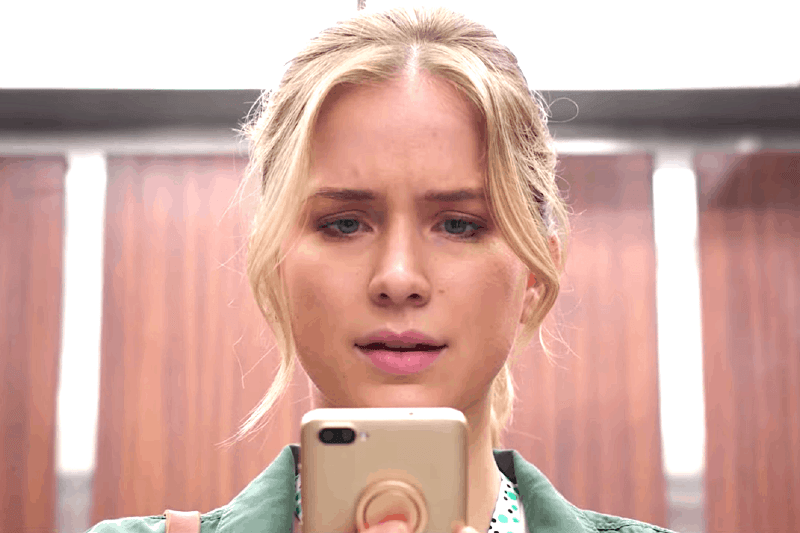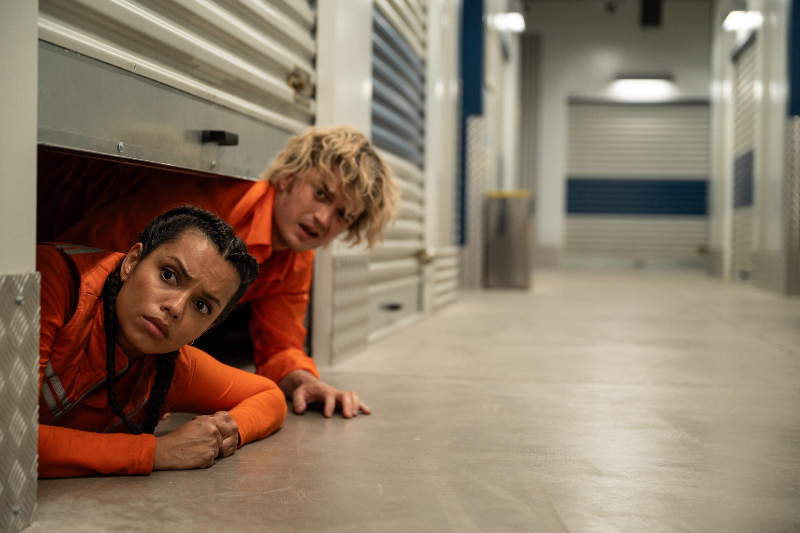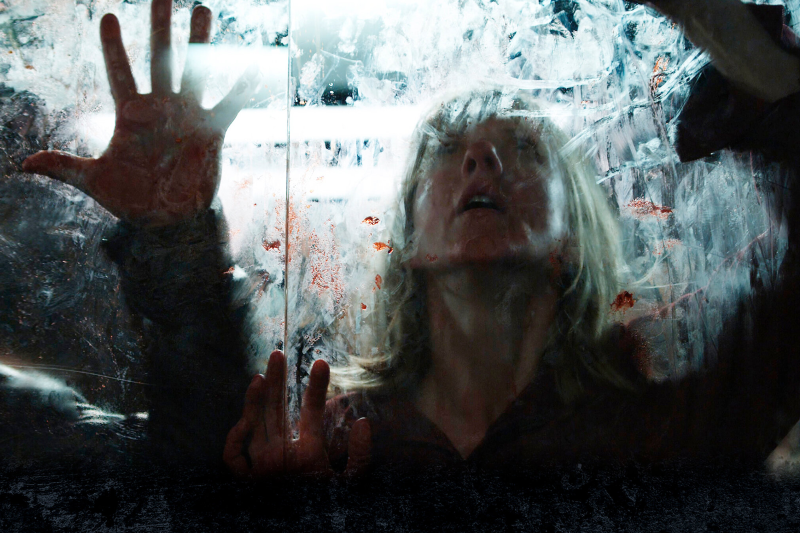I am not a big app person (I type, only sort of lying). My main motivation behind downloading an app is convenience—and socializing, but only if it’s convenient. Thus, you’ll find banking, note taking, emailing, and social media buttons littering my home screen. App peer pressure and FOMO are something I’m the wrong age for, but I know it’s real, and can imagine high school me easily falling victim to it. A group of friends all downloading a goofy new face swap thing or an astrology app with questionable data collecting? I would’ve absolutely accepted unread terms and conditions on a ratty couch in someone’s basement. And it’s that carefree, devil-may-care attitude, coupled with an increasingly relatable, creeping existential dread that makes 2018’s Countdown a true millennial horror movie.
Countdown opens with a group of friends mindlessly downloading the titular app, one that claims to reveal the exact moment of your death. We whip around the table as the kids announce how long they have left to live. Their casual relationship with mortality—plus the fact that it’s gamified—is sobering and modern in its bleakness. One young woman's timer proclaims she has only three hours to live, leaving her visibly shaken. But it’s all just a goof—a game without consequence. It’s just an app you download on a whim, so it can’t be real.
Except it is. You see, when you accept the app’s terms of service, you make a literal deal with a demon. It’s an insidious premise that heavily echoes our very real willingness to allow software we don’t understand into our lives. Countdown is tech horror, but with a priest.
After an effectively spooky opening—a woman with three hours left on her clock is demon-stalked and killed—we meet Quinn. Played by the ever-engaging Elizabeth Lail, who you may recognize from the first season of You, Quinn is designed to be likable. She’s a freshly certified nurse with an effortlessly amiable bedside manner, and she also downloads the Countdown app. Unsurprisingly, her timer reveals she has only days to live.
Along with being hounded by a death demon, Quinn is also sexually assaulted by a superior. Dr. Sullivan, a convincingly slimy Peter Facinelli, forces himself on Quinn. When she refuses his advances, he reports her for misconduct, and she finds herself suspended. This plot point, while seemingly unrelated to the app, becomes the thrust of the film’s finale. Facinelli’s mustache-twirling villainy may seem cartoonishly over-the-top, but it feels all too real. He is the epitome of a terrible man, preying on his trusting young subordinates.
And while this character turn may very well be rooted in the #MeToo movement, the meaning behind its inclusion is decidedly timeless. Men like Dr. Sullivan exist, and too many of us have felt like Quinn. Facinelli’s character, in all his unrepentant awfulness, places Countdown in yet another genre—socially conscious horror.
Quinn’s situation feels hopeless in a way that reaches far beyond the supernatural. She’s isolated and struggling at home (and work) after the death of her mother. Her mental health is deteriorating, and help seems to be in short supply—until she meets Matt (Jordan Calloway), a young man who’s also downloaded Countdown. The two pair up, finding comfort in their shared trauma. They band together and attempt to outwit the demon with help from hip priest and Final Destination alum P.J. Byrne.
Countdown gleefully integrates common tropes and refreshes them. Instead of an older, fleeting academic—think Vincent D'Onofrio’s Professor Jonas in Sinister—we get a man of the cloth more interested in religious lore than being a spiritual leader. Father John treats priesthood like a fandom rather than a calling. He’s joyful, excited to be involved, and indulges his hyperfixation. The pivot of the archetypical expert from dower scholar to theological stan is an excitingly on-the-nose update. It also serves to remove much of the religious grandstanding often employed by demonic horror.
Social commentary and compelling modernizations aside, Countdown is effectively creepy. Simple visual gags—feet walking where they shouldn’t, a finicky nightlight—build a tangible sense of dread. Most of the terror unfolds in explicitly domestic and vulnerable spaces, like bedrooms and bathrooms, where people are alone and exhausted. There’s an intimacy to the horror that’s unnerving, and that intimacy makes the demon all the more foreboding. Nowhere is safe—there is nowhere to hide—and death is an immutable force.
Countdown is relatively small in scope, but its plot is rife with massive implications. The characters are haunted by childhoods that have left them lonesome and detached. In adulthood, they find themselves surrounded by death. They’re terrified, alone, and unsure where to turn for help. There’s an undercurrent of powerlessness that runs through the film, a sense that life ended before it could begin. And in that regard, Countdown is without a doubt a millennial horror movie—an unabashed product of its time.
And yet, Countdown’s reception was lukewarm at best. Which begs the question, if something is so relevant and fresh—a quintessential example of modern horror—then why isn't it more widely celebrated? We’ve seen films with similar characteristics—PG-13, female-centered, tech horror—struggle to find an audience. But one of the wonderful things about film is that it persists. And while Countdown may have missed the mark in 2018, it feels destined to be rediscovered and celebrated by the new generation of horror fans it was so clearly constructed for.
Countdown is a fascinating update to the familiar. It takes what we recognize—demons, priests, and things that go bump in the night—and places them within our immediate time period. In doing so, it tells the story of a hopeless generation. A group of young people faced with failing infrastructure, little to no guidance, and insurmountable odds. Quinn and Matt are just trying to survive, despite their circumstances. But they persist, fighting for a life and a chance. And if that’s not the millennial experience, I don’t know what is.






